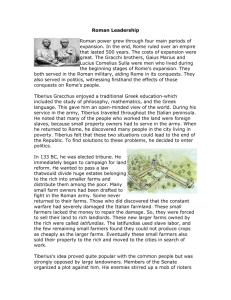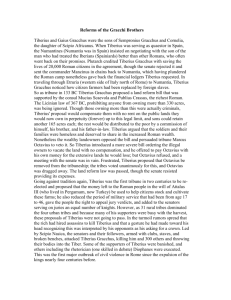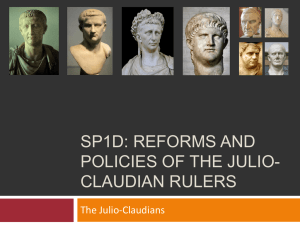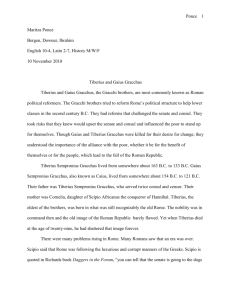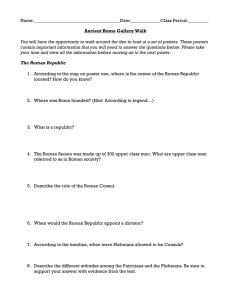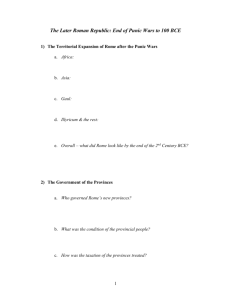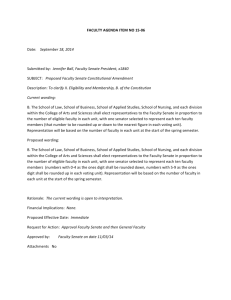Gaius and Tiberius Gracchus.doc - 2010
advertisement
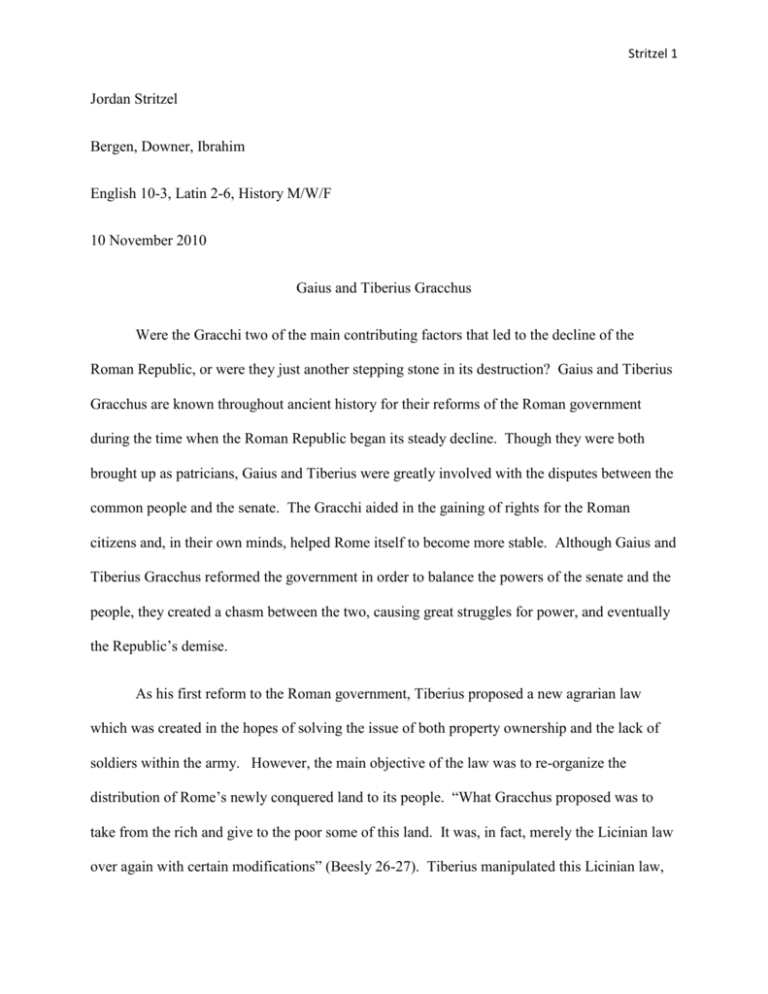
Stritzel 1 Jordan Stritzel Bergen, Downer, Ibrahim English 10-3, Latin 2-6, History M/W/F 10 November 2010 Gaius and Tiberius Gracchus Were the Gracchi two of the main contributing factors that led to the decline of the Roman Republic, or were they just another stepping stone in its destruction? Gaius and Tiberius Gracchus are known throughout ancient history for their reforms of the Roman government during the time when the Roman Republic began its steady decline. Though they were both brought up as patricians, Gaius and Tiberius were greatly involved with the disputes between the common people and the senate. The Gracchi aided in the gaining of rights for the Roman citizens and, in their own minds, helped Rome itself to become more stable. Although Gaius and Tiberius Gracchus reformed the government in order to balance the powers of the senate and the people, they created a chasm between the two, causing great struggles for power, and eventually the Republic’s demise. As his first reform to the Roman government, Tiberius proposed a new agrarian law which was created in the hopes of solving the issue of both property ownership and the lack of soldiers within the army. However, the main objective of the law was to re-organize the distribution of Rome’s newly conquered land to its people. “What Gracchus proposed was to take from the rich and give to the poor some of this land. It was, in fact, merely the Licinian law over again with certain modifications” (Beesly 26-27). Tiberius manipulated this Licinian law, Stritzel 2 turning it into his own, in an attempt to appeal to the people of Rome and gain enough support to guarantee its passing. What Tiberius originally hoped to do was to increase the amount of Roman citizens owning land in order to gain more soldiers for the military to use. This need for soldiers and the lack of landowners caused a vicious cycle within Rome, which Tiberius wished to stop. However, Tiberius met with great opposition from the senate on the matter and was forced to halt his new law from being passed. Once the people learned of Tiberius’ reforms and his new law, the decline of the Roman Republic seemed to set itself into motion, beginning with this new law. The senate feared that it would lose much of its own power through this new law, yet were unable to control Tiberius and the people. While the popularity of Tiberius and the agrarian law increased, so did the worries of the senate over the power of the government. Though the Licinian law had been passed previously to Tiberius, the reformed law gained more support from the commoners though it was lesser in severity to the original, “…for it provided that he who surrendered what he held over and above 500 jugera should be guaranteed in the permanent possession of that quantity…”(Beesly 27). Instead of stripping the land away from the patricians and wealthy nobles who were in possession of this land, Tiberius consented in giving them a large portion of the land in exchange for relinquishing the common people who were in need of it. Naturally, the nobles and patricians involved were in complete disapproval of the agrarian law, evoking the anger of the senate onto Tiberius. The senate forced Tiberius into seeking a vote from his fellow Tribunes, in the end gaining his much sought after approval. To the disappointment of the nobles, the law of Tiberius was passed, thus causing a struggle for power between the senate and Tiberius who represented the common people. Tiberius was extremely outspoken about his disappointment in the Roman government and often used his gift in speech to emphasize this. Stritzel 3 Through his many speeches, Tiberius criticized the control that the senate had over the common people, showing how unfair the laws and how few rights the commoners had. One speech that was given by Tiberius claimed that the senate was being too harsh to the houseless and poverty-stricken common people. ‘“The wild beasts that roam over Italy,’ he would say, ‘have every one of them a cave or lair to lurk in; but the men who fight and die for Italy enjoy the common air and light, indeed, but nothing else; houseless and homeless they wander about with their wives and children…” (Plutarchus 4-5). After the oration of this speech, a shift in the support of the Roman government was made apparent, causing great stress to the senate. The senate felt threatened by Tiberius’ attempts to change Rome and found its power being taken away by Tiberius, who then transferred this power to the poor Roman citizens. The senate began to show its distaste for Tiberius in response to his attempts at ‘reform’ and pondered ways of taking back the city from his grasp. “The senate showed its spite against the successful Tribune by petty annoyances, such as allowing him only a shilling a day for his official expenditure…” (Beesly 34). This sign of contempt put a damper on Tiberius and his supporters, yet it was not enough to halt the internal revolution, which Tiberius had created. Some authors make note of the ‘revolution’ between Tiberius and the senate and compare it to the French Revolution. During the French Revolution, a man by the name of Robespierre led the third estate, or the common people, into a time of many massacres and murders. Though he felt that the Revolution was to be taken to a higher intensity in order for change to occur, the people whom he was striving to create peace for turned against him. Robespierre, in the eyes of the people, had taken the revolution too far, to the point where its objective became skewed. “Reformers who try to do too much too quickly succeed only in doing harm”(Smith 83). In Stritzel 4 comparison to Robespierre, Tiberius was his parallel, in that he stretched beyond what was necessary or what was needed and only succeeded in bringing chaos to Rome. An example of Tiberius’ overstretching of what was needed for the Roman citizens was his manipulation of foreign affairs. “Gracchus wished to divide his [Attalus] treasures among the new settlers, and expressed some other intention of transferring the settlement of the country from the senate to the people…He was also engaged in meditating other important reforms, all directed against the Senate’s power.” (Beesly 34-35). Tiberius was slowly digging a grave for the Roman citizens, yet remained blind to this fact. Scullard, a writer who analyzed the life and times of both Tiberius and his younger brother Gaius, stated in his book, “This was going too far: until now the Senate’s control of finance and foreign affairs had been unchallenged, but Tiberius was interfering in both spheres.” (26). Before this, the Roman senate had controlled all financial and foreign affairs without being disrupted, yet now Tiberius was beginning to break apart that peace and again antagonized the senate. The senate felt threatened by Tiberius and his new ideas on how the government should be run. His final attempt to transfer power from the senate to the Roman people ended along with his life. The death of Tiberius in 133 BC set into motion the violent reign of the Roman senate over its citizens. The senate, after being satisfied by the death of Tiberius, began to rid themselves of all of his supporters as well. Many men and women were slain in order for the senate to retain its control over the Roman people. “Over three hundred of the people were killed and thrown into the Tiber, and the aristocracy followed up their triumph as harshly as they dared. They banished some, and slew others of the tribune’s partisans” (Beesly 38). Rome entered a period of violence as the senate forced its citizens into submission. The chasm, which Tiberius had created with his reforms, between the Roman people and the senate, seemed to grow in depth Stritzel 5 and width. The common people rebelled in their own way by refusing to send their children to school, and also to send their names into the Roman censor in order for them to be sorted into the Roman army. Because of these rebellions, the Roman army diminished, leaving the state lacking in protection and order. Once again, the vicious cycle was in full swing, yet seemed to grow in intensity. In order to regain lost ground, Gaius Gracchus, brother of Tiberius, became the new Tribune of the people and took over what his brother had attempted to accomplish. Although this may have been seen as a good sign on the part of the people, it is believed that Gaius Gracchus was the main contributor of the two brothers to the decline of the Roman Republic. Like his brother, Gaius gave many speeches on behalf of the citizens and often reformed the laws in the state. One of the laws created was the use of the Roman Dole, a welfare system set up by the Gracchi brothers as a source of food and supplies for the poor Roman citizens. This welfare system gained him much popularity, but this popularity did not carry over to the senate. As Tiberius had done before him, Gaius also began to transfer power from the senate to the common people and to also restrict the senate from further use of power in certain areas. A way in which Gaius took power away from the senate was the organization of the Equites, a division of the army under which most military decisions were made. “By organizing the Equites as a political power in opposition to the Senate, as he himself boasted, he had further divided Rome”(Smith 84). The Equites were not required to pass along their decisions to the Senate and mainly took into consideration their personal gains and not the welfare of the people of Rome. Gaius Gracchus pushed the ideas of reform even further than his brother when he created a political group, which rivaled the only permanent body in the Roman government. This obvious attempt brought out the wrath of the senate, causing the death of the second Gracchus. Stritzel 6 Through the deaths of the Gracchi, Rome was able to claim some semblance of peace, yet the steady decline of the Roman Republic marked the separation of the senate and the common people of Rome. Though Tiberius and Gaius attempted to balance the powers of the senate through their reforms, the inevitably cause the Roman Republic’s demise, along with creating a chasm between the senate and its people. The Roman citizens would later gain more rights due to the influence of the Gracchi brothers, who left their mark in history by going against the Roman government and attempting to reform a corrupt system. Had the Gracchi brothers been successful in gaining more rights and power for the Roman citizens to the desired degree, the Gracchi could have possibly been the most influential people in Roman history. Though the intensity of their actions became severe at the end of their lives, Gaius and Tiberius are known for being the voice of the common people who had once been unable to speak.
